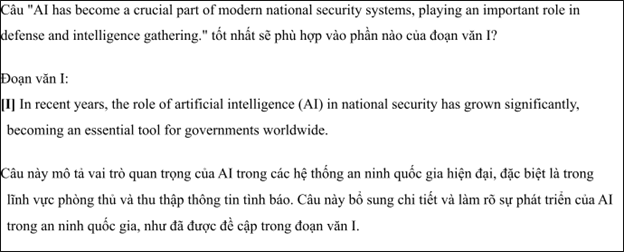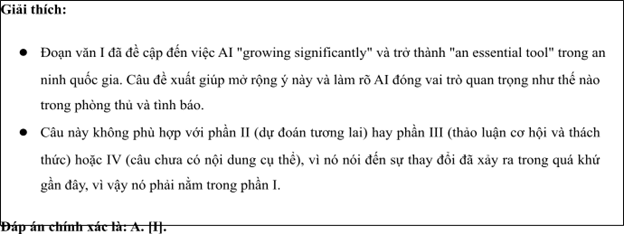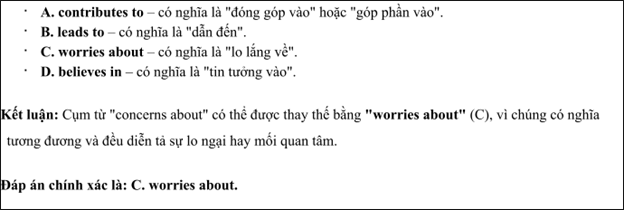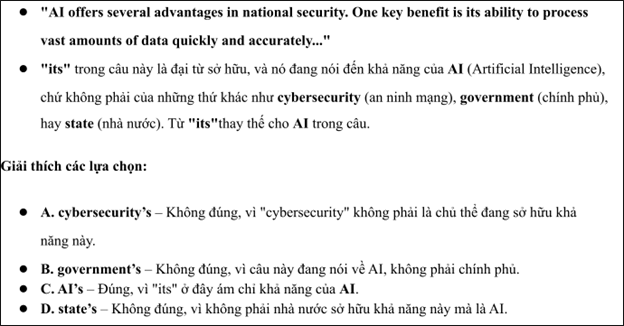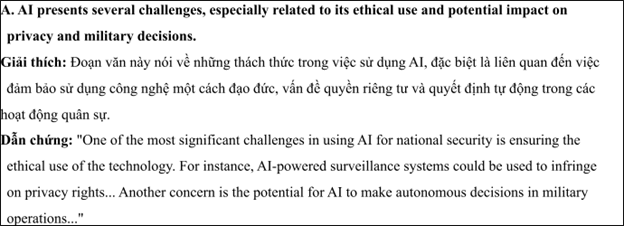[I] In recent years, the role of artificial intelligence (AI) in national security has grown significantly, becoming an essential tool for governments worldwide. [II] As AI technology advances, its applications are increasingly relied upon to enhance defense capabilities, intelligence gathering, and public safety. By 2030, it is predicted that AI will be a central component of most national security strategies, reshaping how governments approach defense and cybersecurity. [III] Various factors contribute to the growing reliance on AI in this field, leading to both opportunities and challenges. [IV]
AI offers several advantages in national security. One key benefit is its ability to process vast amounts of data quickly and accurately, which can help in detecting threats, monitoring suspicious activities, and analyzing patterns for preventive measures. Additionally, AI systems can assist in automating tasks such as surveillance, reducing the need for human intervention, and enhancing efficiency in response times. However, AI also poses significant risks. The use of AI in cyber warfare, for instance, can potentially enable hostile states or organizations to carry out attacks that are harder to trace and defend against.
One of the most significant challenges in using AI for national security is ensuring the ethical use of the technology. For instance, AI-powered surveillance systems could be used to infringe on privacy rights, raising concerns about civil liberties and government overreach. Another concern is the potential for AI to make autonomous decisions in military operations, where the risk of unintended consequences could be catastrophic.
AI is also reshaping the way national security agencies recruit and train personnel. Modern security forces are increasingly seeking individuals with expertise in AI, data analysis, and machine learning. This shift requires a rethinking of traditional recruitment processes and the development of specialized training programs to ensure personnel are equipped to handle the complexities of AI-driven operations.
As AI continues to evolve, it is crucial that governments balance its use in national security with strict regulatory frameworks, transparency, and accountability. This will ensure that the benefits of AI can be harnessed without compromising democratic values or public trust.
(Adapted from daily news)
Câu 31. Where in paragraph I does the following sentence best fit?
AI has become a crucial part of modern national security systems, playing an important role in defense and intelligence gathering.
A. [I] B. [II] C. [III] D. [IV]
Câu 32. The phrase “concerns about” in paragraph 3 could be best replaced by ____ .
A. contributes to B. leads to C. worries about D. believes in
Câu 33. The word “its” in paragraph 2 refers to ____ .
A. cybersecurity’s B. government’s C. AI’s D. state’s
Câu 34. According to paragraph 2, which of the following is NOT a benefit of using AI for national security?
A. AI can process vast amounts of data quickly.
B. AI can automate surveillance and improve efficiency.
C. AI can reduce the need for human intervention in defense operations.
D. AI makes it harder to trace and defend against cyberattacks.
Câu 35. Which of the following best summarizes paragraph 3?
A. AI presents several challenges, especially related to its ethical use and potential impact on privacy and military decisions.
B. The use of AI in national security requires greater transparency to avoid unintended consequences.
C. Autonomous AI decisions in defense operations could prevent human error and improve military response.
D. The use of AI in defense systems poses no significant risk to national security or privacy.
Câu 36. The word “catastrophic” in paragraph 3 is OPPOSITE in meaning to ____ .
A. disastrous B. severe C. beneficial D. alarming
Câu 37. Which of the following is TRUE according to the passage?
A. AI has no significant drawbacks when used in national security.
B. AI systems have no role in cybersecurity or defense operations.
C. AI is becoming increasingly essential in national security strategies.
D. National security agencies have no concerns about the ethical use of AI.
Câu 38. Which of the following best paraphrases the underlined sentence “As AI continues to evolve, it is crucial that governments balance its use in national security with strict regulatory frameworks, transparency, and accountability” in paragraph 4?
A. As AI becomes more advanced, governments must prioritize regulation and transparency in its use for national security.
B. Governments need to focus on increasing the use of AI while ensuring its ethical application in national security.
C. AI should be used freely by governments in national security without much oversight.
D. Strict regulations are unnecessary as AI continues to evolve in the national security sector.
Câu 39. Which of the following can be inferred from the passage?
A. AI's primary application in national security is focused on improving privacy protections.
B. Governments are increasingly concerned with ensuring AI does not harm civil liberties or lead to overreach.
C. The primary role of AI in national security is to replace human soldiers and officers in military operations.
D. There is no significant demand for AI specialists in national security agencies.
Câu 40. Which of the following best summarizes the passage?
A. AI is transforming national security by enhancing data processing and surveillance capabilities, but raises ethical and privacy concerns that require careful regulation.
B. As AI advances, it will completely replace human personnel in national security roles, improving efficiency without ethical risks.
C. AI's role in national security is only focused on improving military operations and cybersecurity, with minimal concern for civil liberties.
D. The adoption of AI in national security is a simple solution to combat emerging threats without any significant risks or ethical considerations.
Second Semester Midterm Exam GRADE 12 Test 11
